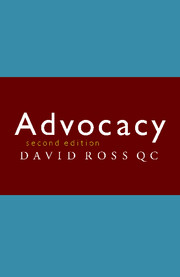Book contents
- Frontmatter
- Contents
- Foreword
- 1 The nature of advocacy
- 2 Preparation
- 3 Witnesses and questions
- 4 Examination-in-chief
- 5 Cross-examination: its qualities
- 6 Cross-examination: method and style
- 7 Cross-examination of experts
- 8 Cross-examination on documents
- 9 Re-examination
- 10 Admissibility, objections and submissions
- 11 The addresses
- 12 Plea in mitigation
- 13 Appeals
- 14 Legal writing
- 15 Etiquette and ethics
- Index
3 - Witnesses and questions
Published online by Cambridge University Press: 31 January 2011
- Frontmatter
- Contents
- Foreword
- 1 The nature of advocacy
- 2 Preparation
- 3 Witnesses and questions
- 4 Examination-in-chief
- 5 Cross-examination: its qualities
- 6 Cross-examination: method and style
- 7 Cross-examination of experts
- 8 Cross-examination on documents
- 9 Re-examination
- 10 Admissibility, objections and submissions
- 11 The addresses
- 12 Plea in mitigation
- 13 Appeals
- 14 Legal writing
- 15 Etiquette and ethics
- Index
Summary
Witnesses
Witness statements
[3000] All witnesses will give some indication of their evidence before the case is heard. In a civil case a plaintiff will go to a lawyer who will note down what the plaintiff says. This is the client giving instructions. The defendant will provide a list of witnesses who may be spoken to first by an insurance investigator. The investigator will prepare a written report on the people interviewed and what was said. The choice of witnesses will then be refined, and the main ones will see the defendant's lawyer who will of course note carefully what is said.
[3005] In a criminal case it is the police who take statements from the witnesses. The police themselves make statements as part of their duties.
[3010] Expert witnesses make statements as a matter of course. Depending on the area of expertise, an expert may be asked to examine an injured plaintiff, or a firearm, or any number of items to check for blood or DNA and so on. Invariably the expert witness will report the findings in writing.
[3015] In a civil case you can ascertain the essence of your opponent's case from the pre-trial documents. Generally each side gives notice of the evidence of any expert witness it intends to call. In a criminal case a prosecutor has a duty to give witness statements to the defence.
- Type
- Chapter
- Information
- Advocacy , pp. 23 - 35Publisher: Cambridge University PressPrint publication year: 2007

